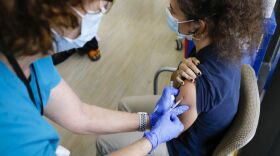-
This year, face masks are on most parents' list of back-to-school supplies. But which ones are most effective? Here's how to choose the right one for your child.
-
After vaccination, antibody levels can help predict how much protection a COVID-19 shot offers, scientists are learning. The finding could speed up the development of future vaccines.
-
Masks are optional for vaccinated kids, and other recommended restrictions have been softened, making for a more relaxed camping experience for children this summer.
-
Scientists around the world are working on a way to inject vaccines painlessly. The trick is to make the needles so small. they don't interact with the nerve endings that signal pain.
-
The CDC will now track only cases of breakthrough infections in which COVID-19 vaccines fail on people who get hospitalized or die. But critics say that's shortsighted and cuts off valuable data.
-
An influential scientific society has recommended scrapping a long-standing taboo on studying human embryos in lab dishes beyond 14 days and greenlighted a long list of other sensitive research.
-
Though the odds are comparable, many parents worry more about the less familiar disease. New mask guidelines have heightened anxiety. Experts explain the actual versus perceived risks of severe COVID.
-
There's a lot of room for dangerous misunderstanding when doctors and public health officials talk to diverse groups about COVID-19. Health literacy projects aim to dispel confusion in all languages.
-
Jennifer Minhas is among those who suffer lingering problems after COVID-19. A diagnosis of POTS, a little-known circulation disorder that mostly affects women, offers a way forward.
-
A personal trainer and trauma specialist explores how a mindful approach to strength training can help people heal emotional trauma.
-
A man who is paralyzed can quickly perform tasks like pouring a glass of water, thanks to a mind-controlled robotic arm that conveys a sense of touch.
-
Fully vaccinated people got the green light last week to resume much of their lives without masks. Behavioral experts say that as an incentive to get more people vaccinated, it's far from a sure bet.















